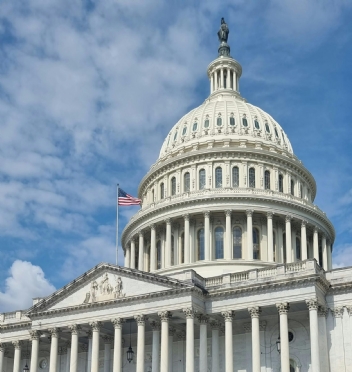Global Perspectives
Globalisation Fracturing: A Playbook For IFCs
This was first published in IFC Review 2025.
Recent market events have seen conventional geopolitical and economic wisdom being shaken to the core, and International Finance Centres (IFCs) find themselves navigating an increasingly fractured and uncertain world. Gone are the days of predictable multilateralism and steady capital flows. In its place, a new era is emerging—one defined by economic nationalism, great power rivalry, and transactional statecraft.
Trump Unleashed

With characteristic bravura, Trump's storming second term has displayed all the nuance of a wrecking ball. The grand MAGA bargain has seen a doubling down on protectionism, deregulation, and America First. A reeling global order is responding in kind, sharpening the contours of a geopolitical landscape that is volatile and fragmented.
Washington has wasted no time wielding tariffs as both a blunt instrument of economic coercion and a key lever of domestic industrial policy. China and the EU have been hit hard by tariffs and further threats of sweeping duties on technology, automotive, and energy imports. Meanwhile, the Paris Climate Agreement has been jettisoned again, paving the way for a full-throttle US oil and gas production expansion. Defence guarantees have become bargaining chips as NATO allies are pressured to "pay their way" or face a withdrawal of Washington's security backstop. Multilateral institutions—from the UN to the World Trade Organisation to the IMF—are facing renewed US scepticism, with veiled threats of funding cuts to bend them to America's will.
For IFCs, this turbocharging of the Trump doctrine presents risks and opportunities. The retreat from multilateralism undermines trade rules, disrupts supply chains and disturbs capital allocation plans. Yet the rewards will be considerable for those agile enough to navigate the shifting tides.
The Global Response: Adaptive and Agile

No great power exists in a vacuum. Still, the global response to Trump's scorching economic nationalism has been rapid. China has buttressed efforts to counterbalance US hegemony, bolstering trade and investment ties with the BRICS, and cementing yuan-based trade agreements. A Belt and Road financing surge has further entrenched Beijing's influence across Asia, Africa, and Latin America. The European Union, though economically beleaguered, is fighting back. Tariffs on key US exports—particularly in agriculture and technology—have been proposed, while new industrial subsidies seek to lure investment away from American shores. The bloc is also fast-tracking financial sector regulations to diversify away from dollar-denominated transactions, a move that—if successful—could erode the dollar's dominance over time.
Elsewhere, energy-producing nations in the Gulf are hedging their bets. At the same time as announcing record investment into the US, the petrodollar's supremacy is being quietly challenged, with Saudi Arabia and the UAE exploring energy deals denominated in Chinese yuan and Indian rupees. As geopolitical tensions rise, financial transactions are increasingly structured outside traditional Western banking channels.
A New Reality For IFCs
Small State IFCs face a dual challenge. They must first navigate the headwinds of protectionism, economic nationalism, and regulatory fragmentation. Secondly, they must seize the moment—positioning themselves as indispensable conduits for global capital in an era where neutrality, efficiency, and innovation, are more prized than ever. Taxation remains a key battleground.
Given the Trump administration's withdrawal from the Pillar One and Two reforms, the OECD's business tax initiative has taken a heavy blow from a hostile White House. This resistance has stoked ambiguity and opportunity. IFCs, with their robust legal frameworks and competitive position on tax neutrality, remain attractive international hubs for investment structuring, provided they maintain their standing as responsible, compliant jurisdictions.

Digital assets and financial technology are also front and centre. As established capital flows are confronted with new challenges, the emergence of blockchain-led finance presents a new avenue. IFCs that support digital assets—while providing regulatory certainty and investor confidence—can gain immensely from this revolution. Similarly, as artificial intelligence (AI) reshapes global financial services, those who position themselves as AI-driven regulatory innovators will gain a competitive edge.
Green finance remains a bright spot, even amid America's regulatory retreat. With Europe and Asia forging ahead on sustainability initiatives, IFCs can carve out a leading role in ESG-compliant investment structuring, green bonds, and sustainable capital markets. As capital flows recalibrate in response to climate-driven incentives and penalties, those with expertise in green financial instruments will be in demand.
Trump's Five T's Revisited
If Trump's first presidency was guided by the Five T's—Tariffs, Trade, Tax, Technology, and Territorialism—his second term has refined them into an even sharper economic and geopolitical toolbox.
- Tariffs remain the primary tool of coercion against adversaries and allies who fail to align with US economic priorities. For IFCs, trade uncertainty will persist, and capital will flow towards jurisdictions that provide stability and predictability.
- Trade has become increasingly bilateral, with Washington sidestepping multilateral trade agreements and favouring bespoke deals prioritising domestic economic gains. IFCs that can facilitate investment structures aligned with this new trade architecture will thrive.
- Tax policy continually changes, and US corporate tax policy is directed toward repatriating investment to home shores. However, this does not mark the end of international tax planning; instead, it calls for progressively sophisticated cross-border planning techniques.
- Technology is both an opportunity and a battlefield. AI, digital currencies, and cybersecurity, are at the heart of geopolitical competition. IFCs must ensure they are not just facilitators of capital flows, but also hubs of regulatory expertise in emerging financial technologies.
- Territorialism—perhaps the most fundamental shift—has transformed economic relationships into national security matters. IFCs should navigate this problematic terrain through quiet diplomacy. Projecting a 'neutral' and 'useful' character, diligently attached to global compliance standards, will pay handsome dividends.
Navigating The Future: Strategic Imperatives For IFCs

An altered world is emerging; it demands agility. IFCs must double down on service and regulatory excellence, reinforcing transparency while ensuring operational flexibility. Capital flows will undoubtedly favour the US, at least in the near term, and this new surge of US bound FDI-based activity will need expert structuring and tax-neutral vehicles to facilitate pooled investment from across the globe.
IFCs must forge economic alliances beyond traditional Western financial centres, tapping into the growth of non-aligned economies and de-dollarisation trends. Sustainable and digital finance must become key pillars of the IFC strategy, not afterthoughts. Above all, IFCs must embrace their role as neutral facilitators of global capital flows, and wealth creators for the many and not just the few. In an era of increasing bloc politics and economic nationalism, those offering stability, predictability, and efficiency will survive and thrive.
A World Reordered
The first 100 days of Trump 2.0 are set to confirm what many suspected—the old order is gone, and a new era of transactional politics has dawned. For IFCs, the challenge is clear: adapt, innovate, and remain indispensable. Those navigating this new shape-shifting landscape will cement their status as vital investment hubs while contributing substantially to the wealth of all nations.
About our Blog
Global Perspectives provides regular, on-point commentary on relevant topics in a pithy and accessible way. Our observations and points of view are based on listening hard to clients global needs, priorities and concerns. We draw on insights from every area of our business and collaborate to deliver this global thinking; something that clients tell us is distinctive and sets us apart. If you'd like to find out more, please get in touch.
View our previous posts here.
About Mourant
Mourant is a law firm-led, professional services business with over 60 years' experience in the financial services sector. We advise on the laws of the British Virgin Islands, the Cayman Islands, Guernsey, Jersey and Luxembourg and provide specialist entity management, governance, regulatory and consulting services.
.jpg)


